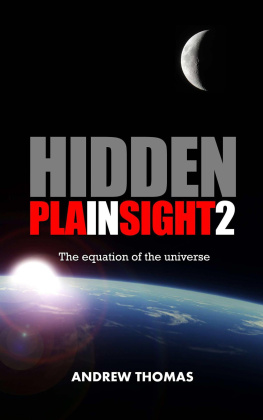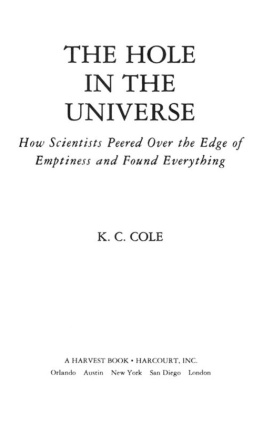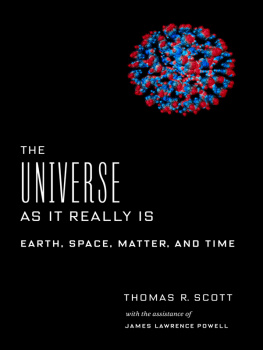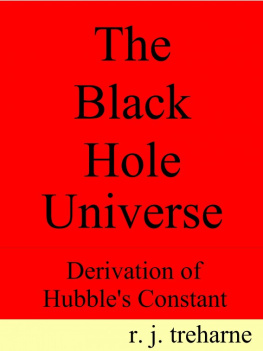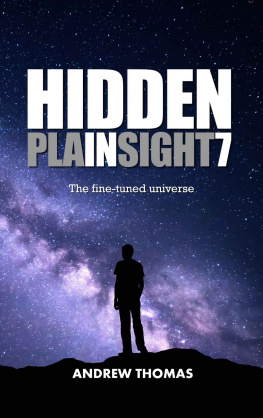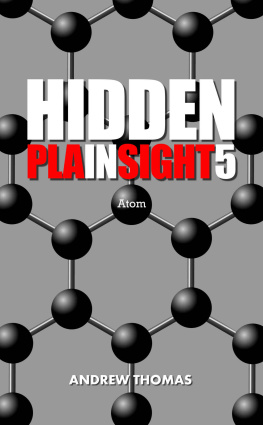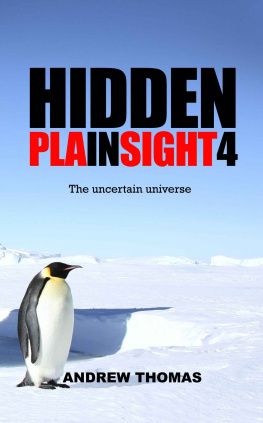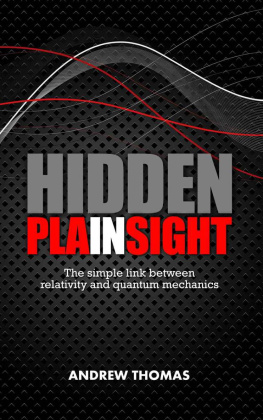HIDDEN IN PLAIN SIGHT 2
The Equation of the Universe
Andrew Thomas studied physics in the James Clerk Maxwell Building in Edinburgh University, and received his doctorate from Swansea University in 1992.
He is the author of the What Is Reality? website (www.whatisreality.co.uk), one of the most popular websites dealing with questions of the fundamentals of physics. It has been called "The best online introduction to quantum theory".
His first book, Hidden In Plain Sight, is a science best-seller.
ALSO BY ANDREW THOMAS
Hidden In Plain Sight
The simple link between relativity and quantum mechanics

HIDDEN IN PLAIN SIGHT 2
The Equation of the Universe
Copyright 2013 Andrew D.H. Thomas
All rights reserved.
DEDICATION
To Mum and Dad
CONTENTS
PREFACE
This is my second book. I was absolutely delighted at the success of my previous book, Hidden In Plain Sight. If you bought my previous book, then thank you very much. If you have not already read Hidden In Plain Sight I can recommend it as some of the work in this book builds on the principles described within it.
The discussion and reasoning in this new book might appear to be extraordinarily simple. This is quite deliberate. As I explained in my previous book, I am convinced that the fundamental principles which underlie reality must be simple. The drive to uncover the fundamental truths of physics must surely be a drive toward simplicity.
After considering the link between quantum mechanics and relativity in my previous book, this book considers a possibly simple solution to the unsolved mysteries behind gravity, dark energy, black holes, and many other cutting-edge problems in current theoretical physics. My books are nothing if not ambitious!
I deliberately make my books fast-paced and easy to read, packed with only relevant information and no padding.
So it's a book with a real big bang!
Andrew Thomas
(hiddeninplainsightbook@gmail.com)
Swansea, UK
2013

INTRODUCTION
As physics progresses along its path of unlocking the secrets of the universe, it might be thought that the number of unsolved problems would be reduced. However, this does not seem to be what is happening. Instead, the more we find out about the universe, the more problems we unearth. And the problems we discover seem deeper, more profound, and more insoluble than the problems we have just solved. This was summed-up by the great physicist John Wheeler: "We live on an island surrounded by a sea of ignorance. As our island of knowledge grows, so does the shore of our ignorance."
It has been suggested that the field of theoretical physics seems to be in less-than-superb shape at the moment. The main thrust of research towards a possible "theory of everything" is directed towards string theory. This may well eventually emerge to be the correct model of Nature, and a great deal of very clever people seem convinced by it, however, considering the amount of research effort which has been directed at this theory over more than four decades, it is hard to disagree that progress has been disappointing. But there appears to be a lack of diversity of alternative research. String theory has been called "the only game in town", and maybe that is the heart of the problem.
Meanwhile, the highly-publicised discovery of the Higgs boson by the Large Hadron Collider (LHC) seems to have created panic among particle physicists. You might find that surprising, after all, didn't they predict that the Higgs boson was there to be found? Well, yes, they did and that's the problem. An experiment which just verifies your prediction tells you nothing new about reality. It so happens that the properties of the discovered Higgs boson were a particularly close match to those predicted. Eight billion euros to tell you something you already knew does not sound like good value for money. There is no hint in the LHC results of new directions for research, and hence there is no convincing motive to spend new money. This sounds very much like the end of the line. A lot of particle physicists are scared for their jobs.
It appears that the LHC has also brought bad news for string theory. The full name of string theory is "superstring" theory, with the "super" standing for "supersymmetric". According to supersymmetry (or SUSY), each elementary particle is paired with a superpartner particle. However, the LHC has not detected any of these predicted particles.
If I had to sum up the current state of theoretical physics, I would say it lacks direction. It appears that we have come to the end of a long road and we have no map to tell us which direction to take next.
So where do we go from here? Well, if you are like me, you got interested in physics because you want answers. You want to get to the bottom of things. We want to know "why" things happen. However, most physics research is merely aimed at describing the phenomena of Nature it is not aimed at answering fundamental questions of "why". Such questions would be considered the domain of philosophy, not physics.
A good example are the equations of general relativity, which describe gravity as emerging from the curvature of spacetime. These equations are clearly an improvement in accuracy over Newtonian gravity, but seem to get us no further along the road of explaining just why masses attract each other. Saying that masses follow straight lines in a curved spacetime does not answer the fundamental question of why objects follow a straight line in curved spacetime. We are just describing the phenomena not explaining it.
And so many of these descriptions seem excessively complicated to my eyes, string theory in particular seeming to revel in excessive mathematical virtuosity. It seems as though we are moving away from a search for simplicity in favour of increasing complexity. Is this really the likely route to unlocking the secrets of the universe? I feel very strongly that as we dig deeper, and approach more fundamental levels, then our theories should actually become simpler and easier to understand. My books reflect this belief.
The majority of current research seems only interested in capturing the minutiae of the complexity of Nature there is no consideration of the bigger picture. I would agree with Sir Patrick Moore, the sorely-missed presenter of the long-running BBC television programme The Sky At Night: "The one inescapable fact is that we exist, and so does the Sun, the stars, and the Earth, and everything else. And no one has yet explained how the matter came into existence in the first place. Which adds force, I think, to my own contention that we are pretty strong on detail but we are still very weak on fundamentals."
In my series of books, I am trying to get to the bottom of things. By working with fundamental principles it appears we can get satisfactory answers to questions of why Nature behaves the way it does.
Simple solutions to big problems

